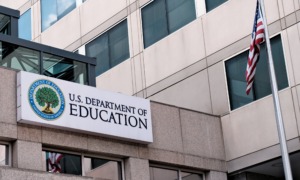Washington — Poetry propels young people onto stages in front of hundreds of people and in the midst of world leaders.
Slam poetry is a growing artistic platform among youth, and programs have sprouted in schools and out-of-school organizations across the nation, fostering hundreds of spoken word poetry teams who compete in national contests like Louder Than a Bomb and Brave New Voices. Explosive performances on stages travel far beyond crowded auditoriums via the internet to inspire the next generation of performers and offer insight to those in power on the state of the youth zeitgeist.
“[It’s about learning] that there is an explanation for the state that you’re in, and that once you can see that web of causality, you can actually effect change in a positive way,” said Joseph Green, poet and Split This Rock Youth Programs coordinator. “Your words can get in front of people who matter, and it’s not good policy if it’s not informed by the people who are going to be affected by it.”
Split This Rock Youth Programs is a part of the national socially active poets’ network whose members have performed for advocates like the Coalition for Juvenile Justice and for government officials at the White House. Their website unabashedly calls for youth to engage in public leadership for social justice: “Calling poets to a greater role in public life and fostering a national network of socially engaged poets.” Youth programs offer poetry training and workshops, host open microphone events and assemble the D.C. Youth Slam Team for Louder Than a Bomb, which they won last year.
“What’s unique about those spaces is that they are from young people, yet they are facilitated by adults,” said Tara Dorabji, director of strategic communications for Youth Speaks, a 20-year-old nonprofit that produces youth poetry slams and festivals, including the annual Brave New Voices slam poetry competition. “Our mission is to work with young people and facilitate spaces where they can really activate their voice through arts and arts experiences, and then build skills from there and apply their voices in different ways, at times, making choices and having opportunities to apply their voice and their poems in the context of larger social justice issues and movements.”

Split This Rock Youth Programs coordinator Joseph Green speaks to the audience before the D.C. Youth Slam Team qualifying competition.
Youth ownership through words
One of the eight team-qualifying slams for the capital city team was held on a warm fall evening in the basement space of Real Talk D.C. on Pennsylvania Avenue, about a half mile from the United States Capitol. The qualifier was part of the weekly Floetic Fridays open-microphone event, held in the safe sexual health awareness organization’s headquarters, known as the FreeStyle Center.
Although adults organize these events, Dwayne Lawson-Brown, Real Talk D.C.’s youth health educator for social mobilization, said the slams show how the youth take ownership of the events through the words they share.
“Here in D.C., the adults who organize it recognize that this is for the youth,” Lawson-Brown said over stacked boxes of donated pizza as hip-hop beat through the basement arranged with metal folding chairs and couches that faced a small triangular stage. “This is their voice. During the slams and the open mics, for the most part, adults aren’t really involved. Youth … or near-age youth are hosting the event.”
Lawson-Brown said the only role adults play is setting the stage in a community that fostered the 2014 National Youth Poetry Slam champions. Washington has a tight poetry scene, he said, which allows poets to feel comfortable and accepted in their work. The active spoken word poet offered himself as the sacrificial goat poet, speaking the first poem of the night, which is meant to loosen up the crowd and judges before the contest begins.
Young people participate in poetry for many different reasons — personal expression, therapeutic outlet and social action. Qualifying competitor Antonio Poetic Hardy, 17, said he writes poetry to keep the creativity and passion of his inner child alive, which helps his work in the graphic design business he recently started. “I feel as though you should always keep that fire alive, and that’s what writing and expressing myself through pen and paper means to me.”
Andrew Hesbacher, 19, earned third in the qualifier. Hesbacher got addicted to bacher got addicted to spoken word when he attended the 2014 Brave New Voices contest in Philadelphia, which the D.C. Youth Slam Team won. “I was hooked immediately,” he said.

Youth Slam Team qualifying competitor Antonio Poetic Hardy, 17, eats donated pizza behind the front desk and PA system before the slam begins.
As he has progressed as a poet, Hesbacher said he has learned to take on social issues and promote change. “For the longest time [poetry] was a way to get feelings out of myself,” he said. “As I’ve gotten older, and I’ve gotten better at dealing with my mental health, I’m finding I’m writing a lot more about things that I care about.”
Trae Stocks, 19, took first place out of seven competitors at the qualifier with his poems “Mans ’n‘ Them” and “Tune.” “Mans ’n‘ Them” is a rendition of Rasheed Copeland’s work of the same name. Stocks was so inspired by Copeland’s piece that he asked permission to write his own version of the poem created by the 2015 second place Individual World Poetry slam winner and former D.C. Youth Slam Team member. It’s about the ironies and struggles of growing up as a black man.
Stocks perceives poetry as a youth-led movement, because young people often instigate changes in poetic craft and delivery. “It’s youth-driven because most of the newer changes that happen come from the youth,” he said. “I do feel like we have our own style of poetry that’s specific to my generation. I hear poems where they speak poetry for a certain amount of time, then they start rapping, then they sing, then they go back into the poem. They incorporate so many more styles into the poetry. I think a lot of the things my generation gets inspiration from is more free-flowing, the music, the fashion, there’s no boundaries anymore.”
Slam poetry’s start
Breaking down boundaries is why Anne MacNaughton created one of the first spoken word youth poetry teams in New Mexico in 1994. She was a Taos High School English teacher and co-founder of the World Heavyweight Champion Poetry Bout at the Taos Poetry Circus’ professional spoken word competition. When she saw students getting into trouble for cussing in the hallway during rap battles, she decided to give them a place to speak their minds without fear of punishment.
“I went out and swept them into my room and closed the door,” she said. “I allowed them to continue to express themselves, and they really had a good time. That’s when I started [teaching them] poetry.”
In the beginning, the poetry club met before and after school to learn and listen to each other’s work. MacNaughton said students who had problems with authority and troubled lives found an outlet that made them feel heard and appreciated.
About a year later, MacNaughton said the Taos youth poetry group hosted the first statewide youth spoken word competition in the nation. The event was based on the teachings of experienced slam poets, Juliette Torrez and Matthew John Conley. “We ended up creating the first state championship poetry slam event. At that time it was all individuals. There weren’t teams, yet. As the state-wide event grew, we actually moved on to using teams.”

Even the trash cans at Real Talk D.C.’s FreeStyle Center are canvases for expression.
MacNaughton believes youth use poetry not only to speak out to adults, but also to build a generational relationship and break down boundaries between each other by sharing what they’re going through.
“It’s about verbal expression of internal growth that allows you to assess your situation in the world,” she said. “The kids are talking to each other in these poems.”
Moving a crowd
As a junior in high school Yonas Araya, Split This Rock Ushindi Performance Troupe member, used the platform of poetry to talk about substance abuse at the White House, for Queen Silvia of Sweden, and at the Kennedy Center.
The greatest part of the experience for the 16-year-old was seeing people in positions of power emotionally moved by a poem about his aunt who was addicted to heroin.
“There were some people in the crowd that were crying,” he said. “At that moment it was the first time that I realized my words can have a big effect on, if nothing else, someone’s emotions. I think that’s the core of everything, because if you can be moved emotionally by what someone says it can drive you to act on those emotions. People will forget what you say, but they will never forget how you made them feel.”
Lauren May, 16, also felt the powers of emotional poetry during a D.C. Slam Team trip to South Africa. The Split This Rock Ushindi Performance Troupe and former D.C. Youth Slam Team member wasn’t speaking to high-ranking officials, but was still capable of promoting change. Her poem about rape culture had a large impact on a class of South African high school students.
May said rape is a serious and taboo issue in South Africa. One young woman connected with May’s poem so much that she stood before the class, thanked May for her bravery, and recited a personal poem, written just after May’s performance. Her brand new verses spoke of being shamed as a rape victim. The student received hugs from her classmates, and her poem sparked a group discussion on the rarely discussed subject.
“I’m like, oh my goodness, this girl in another country has the same kind of problems that I have, and that was the first time that I experienced something as huge as that,” May said. “What I say actually matters to people across the world. After that moment, I vowed to never stop [writing poetry].”
Seeing people come together is how Green measures success at Split This Rock Youth Program. Through all of the slams he has supported, the most beneficial outcome from the youth poetry movement he witnessed was on the D.C. Metro: “I ran into a group of young people that consisted of folks from D.C. and Virginia [who] I didn’t know knew each other,” Green said. “I’d worked at both of these schools. I’d seen them meet each other at the Louder Than A Bomb festival, but I didn’t know that they’d kept in touch to the point where they were just hanging out.”
The multiracial group of students was simply spending time together — the simple product of what organizations like Split This Rock hope to deliver; a movement of acceptance and community. Green reflects: “That is a real-life, tangible product of allowing young people a space where they are safe, and where they can begin to create connections that will hopefully — if the connection itself does not last a lifetime — will teach them to take chances with people who live outside of where they come from.”


























